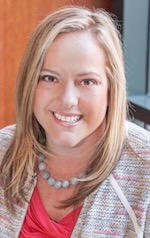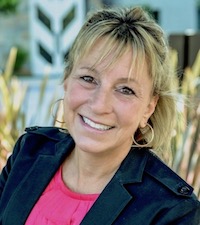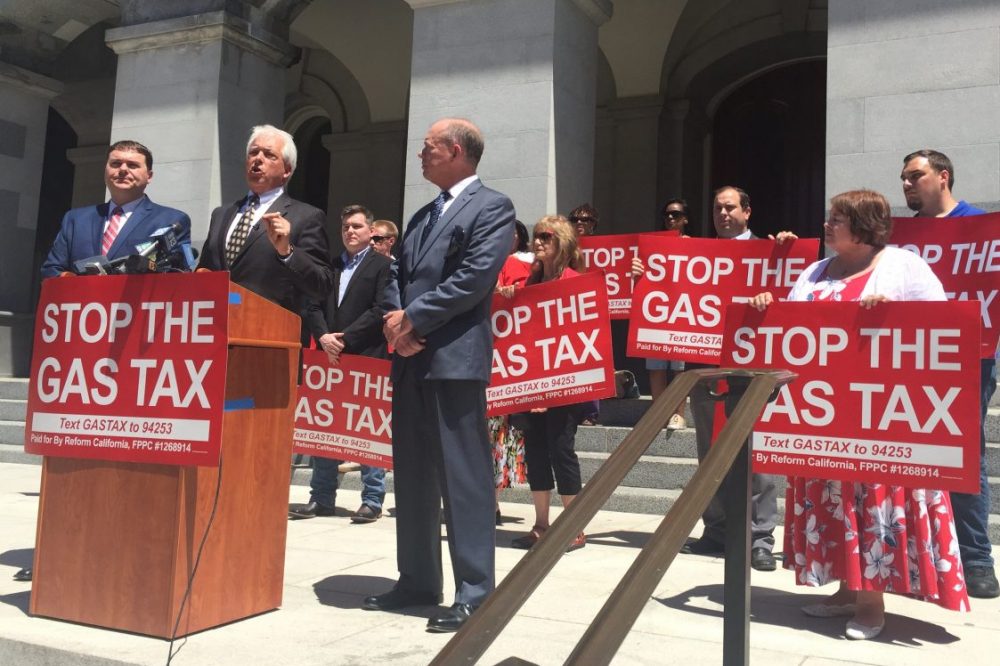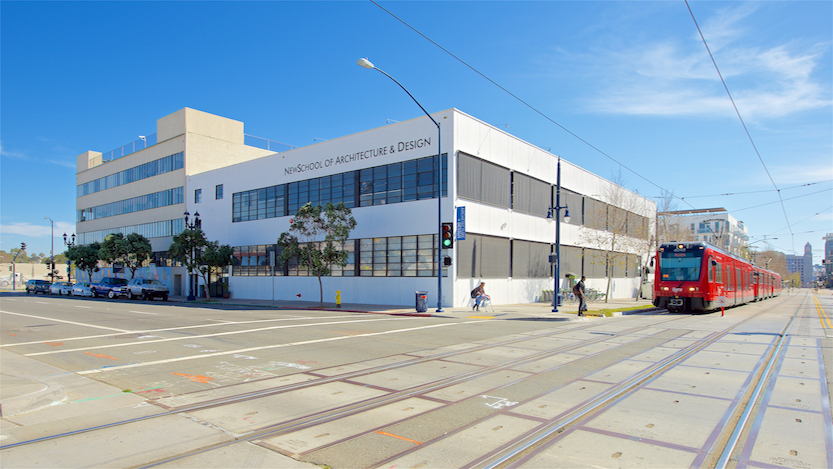Daily Business Report-Aug. 13, 2018
Campaigning at the Capitol for Prop. 6 to repeal the gas take hike: from left to right: Carl DeMaio, chairman of Reform California; John Cox, Republican candidate for governor; Jon Coupal, President of the Howard Jarvis Taxpayers Association.
Election 2018: Transportation
Is the Republican story about repealing
the gas tax hike too good to be true?
By Ben Christopher | CALmatters
California Republicans say that drivers can have smoother roads, more reliable public transit—and lower taxes.
In November, voters will get the chance to repeal a recent increase in the state gas tax and assorted vehicle fees. That tax hike—an extra 12 cents per gallon of gasoline, 20 cents per gallon of diesel, and two new vehicle registration fees—was signed into state law last year, part of a Democratic-led transportation package that directs an extra $5 billion per year toward the state’s dilapidated roads and highways. Making voters pay more at the pump is a tough political sell, but Democrats and other defenders of the law argue that our infrastructure is long overdue for an upgrade. The gas tax hasn’t been increased in over 20 years while the cost of highway construction has tripled. And, they say, you can’t get something for nothing.
Not so, say supporters of the repeal, Proposition 6. Chief among them is John Cox, the Republican running to be California’s next governor.
“The Democrats decided to do the easy thing in their view, and that is just keep sticking their hands in the pockets of Californians,” he said, “instead of doing the hard work, which would have been standing up to the donors, standing up to the special interests, and using our money effectively and wisely.”
California, he added, “spends multiples of what other states spend on a mile of road.”
In trying to sell voters on Prop. 6, which would also require voter approval for all future driving-related tax hikes, supporters like Cox make the following arguments:
• California transportation spending is out of whack with most other states.
• Bloated transportation agencies, public sector unions, and red tape are to
blame for those higher costs.
• Political leaders could cut that wasteful spending—saving taxpayers billions and rendering higher taxes unnecessary—if only they had the will and the courage.
These add up to a potentially enticing argument.
The question is: Should voters believe it?
Prop. 6 skeptics are right to say that repealing the new taxes and fees will necessarily mean cutting back on something. Supporters have so far been a little vague on what that something is. Wasteful spending or vital public services—it’s entirely in the eye of the taxpayer.
The cost of a California highway
When asked for evidence that California can’t manage its transportation budget, the Cox campaign points to a recent report published by the libertarian Reason Foundation. According to its findings, the state government spends more than $471,000 per mile of road that it maintains. That’s nearly triple the national average of about $178,000. By this measure, California has the eighth most expensive state road system in the country.
Given that our roads are in such rough shape and California also has among the highest gas taxes in the country, one might reasonably wonder whether drivers and taxpayers here are getting a raw deal.
The California Department of Transportation (Caltrans) argues that the report inflates the state’s true costs by measuring each state’s highway system simply by totaling its length. According to Caltrans, California highways have an average width of over 3.4 lanes compared to a national average of 2.4, which makes the same length of highway more expensive to maintain. In effect, the report treats a two-lane highway in Oklahoma the same as an equally long stretch of California’s I-405, all 14 lanes of it.
The Reason report is a rare effort to compare across state agencies because it’s difficult to do. Different state agencies are responsible for different aspects of the highway system, subject to different rules, and operate in vastly different climates, terrains, and economies.
“More than 40 percent of the nation’s freight is moved through California, which has three of the nation’s top five busiest ports in Los Angeles, Long Beach and Oakland,” a spokesperson for Caltrans said in an email. That extra wear and tear adds to the state’s overall maintenance tab.
Asked if the federal government compares transportation spending across states, Doug Hecox, spokesman for the Federal Highway Administration said different methodologies will produce wildly different estimates.
“There are many ways to bake a cookie and everyone has a different recipe,” he said. “Welcome to my personal hell.”
____________________
Women-led nonprofits form partnership
to boost entrepreneurial efforts

Women entrepreneurs in San Diego and Imperial counties have expanded resources, thanks to a new cooperative effort between business accelerator Hera Labs and the San Diego & Imperial Women’s Business Center (WBC).
The nonprofit San Diego WBC reached out to Hera Labs, also a nonprofit, to provide curriculum and training for its members, who include female business owners and new entrepreneurs. The additional courses will expand the center’s work in assisting start-ups and established businesses with loans, marketing, contracting, technology and more.
Hera Labs has a track record of successfully launching and scaling more than 500 San Diego-based businesses owned by women through its intensive 12-week curriculum. The new partnership means the courses will also be offered at the Women’s Business Center, which is located at Southwestern College at the Center for Business Advancement in National City.
“We’re focused on helping women entrepreneurs thrive, no matter where they live, what phase of life they’re in or what industry they serve,” says Silvia Mah, executive director of Hera Labs. “By joining forces with the Women’s Business Center, we’re meeting women exactly where they are and in their own backyards to provide rigorous business training that will advance their businesses and expand their network.”
Applications for the 12-week Launch and Scale programs are due Sept. 1 and the courses kick off on Sept. 27. Some scholarships are available through the San Diego WBC.. Women are encouraged to apply via the following links:
For early stage business ideas: heralabs.com/programs/launch-intensive
For existing businesses ready to pivot or scale: heralabs.com/programs/scale-intensive
____________________
Secret DMV office near California
Capitol serves lawmakers and their staffs
Sacramento Bee
If you enter the Legislative Office Building in downtown Sacramento, pass through security and hook an immediate left, then walk to the end of the hallway and take another right, at the end of that hallway is an unmarked door with a peephole.
Inside you will find the Capitol office of the California Department of Motor Vehicles, an unlisted branch where elected officials can register their cars, renew their driver’s licenses — or apply for the new federally-mandated Real ID card that has been driving up wait times at DMV field offices across the state.
From 8 a.m. to 5 p.m. on Monday through Friday, with an hour break at noon for lunch, in-person service is available by appointment, according to a brochure obtained by The Sacramento Bee. The office serves current and retired members of the Legislature and Congress; current legislative staff; employees of the Legislative Analyst’s Office, the Legislative Counsel and the Legislative Data Center; and elected and appointed officials.
It is also the primary point of contact for lawmakers who receive complaints from their constituents about the DMV, according to DMV spokesman Artemio Armenta.
____________________

UC San Diego announces historic
$312 million fundraising year
UC San Diego reports that more than $312 million was raised during fiscal year 2017-2018—a record-breaking amount for any San Diego institution of higher education in a single year. The funds go toward the university’s $2 billion goal as part of the Campaign for UC San Diego. Since the campaign was launched in 2012, $1.6 billion has been raised.
The $312 million fundraising total for the fiscal year ending June 30, 2018, represents a 17 percent increase from the prior year, when philanthropic support totaled $267 million. UC San Diego’s base of over 185,000 alumni has played an increasingly significant role in supporting the campaign to ensure its success. Alumni leaders comprise 52 percent of the Campaign for UC San Diego Cabinet and are taking an active role, not only as donors, but also as campaign ambassadors.
This year, 60 percent of philanthropic support was designated to support campus departments—fueling new programs, centers and initiatives within the campus’ academic divisions.
____________________
Supervisors Greg Cox and Ron Roberts seek
review of county’s child welfare system
County Supervisors Greg Cox and Ron Roberts have asked the chief administrative officer to create a working group that would conduct an assessment of the county’s child welfare system and provide recommendations for improvements.
“Our child welfare system has made great progress in recent years while implementing new state and federal regulations, but we believe in continuously improving our programs and services to better serve our children,” said Cox. “In that spirit, we are asking for this review of our foster care system with feedback from experienced community partners.”
“More than 15 years ago, Greg and I organized a comprehensive look at the child welfare system, and the results were San Pasqual Academy for foster youth and a series of subsequent best-practices policies,” said Roberts. “With so much change having taken place in the intervening years, the time is right for a fresh assessment.”
The Supervisors seek the creation of a Working Group that will work under the County’s Child Abuse Prevention Coordinating Council. The 13-person group would review the child welfare system looking for improvements to ensure the health and safety of youth in foster care.
The Working Group is expected to provide a full report to the Child Abuse Prevention Coordinating Council by November and a list of recommendations to the Board of Supervisors by December.
____________________
Personnel Announcements
Jill Epstein named executive director of Miracle Babies

Miracle Babies, a nonprofit organization that provides financial and emotional support to families with critically ill babies in the neonatal intensive care unit (NICU), has named Jill Epstein as its executive director.
Prior to joining Miracle Babies, Epstein was the executive director of the California Association of Marriage and Family Therapists (CAMFT), an independent professional organization representing the interests of 32,000 licensed marriage and family therapists. She served as the first chief operating officer of the California Massage Therapy Council, an organization created by the California Legislature to develop and implement statewide voluntary certification for massage therapists.
Epstein moved to San Diego from Chicago, where she spent seven years as the CEO of the Chartered Financial Analysts Society of Chicago. In an 11-year span in Washington, D.C.,she worked for the American Medical Association, the National Committee to Preserve Social Security and Medicare, and AARP.
Epstein currently serves on the Solana Beach School District Independent Citizens’ Oversight Committee and on the Solana Beach School District Foundation Board of Directors.
__________________________________________________________
SUBMARINE SWIM




